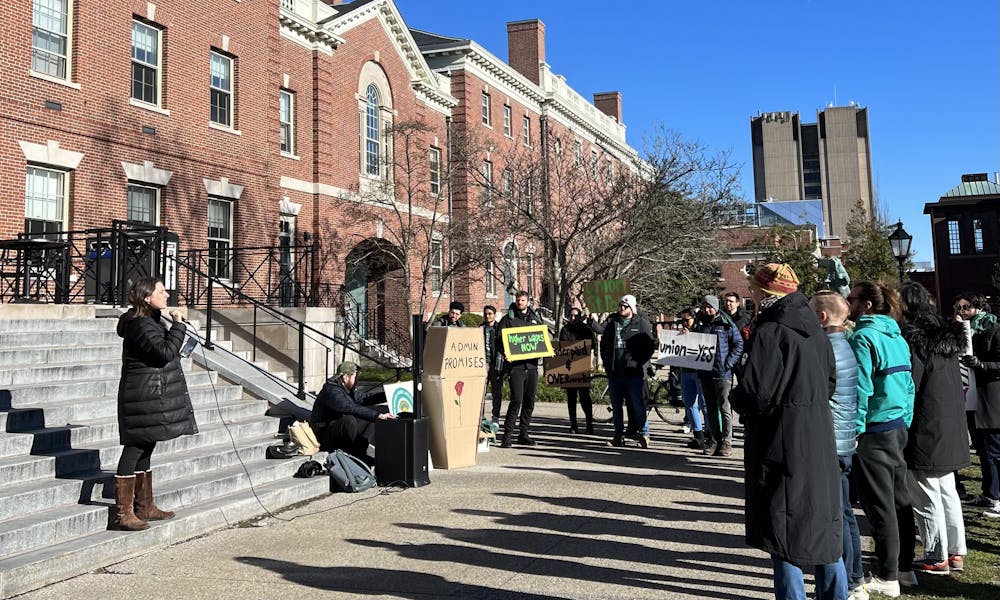Roughly 35 University community members joined a Tuesday noon rally in front of Stephen Robert ’62 Campus Center organized by the Brown Postdoc Labor Organization to celebrate the group’s unionization plans.
A Friday BPLO press release also stated that organizers are “seeking wage increases, support for international postdocs, expanded benefits for postdocs who are parents or becoming parents and more equitable provisions for all.”
During the rally, BPLO organizers distributed shirts that read “I love my research but love doesn’t pay the bills” and “My union has my back.” Attendees also carried signs reading “Underpaid and overworked,” “Higher wages now,” “Brown’s word is worth nothing” and “Divided we beg, united we bargain.”
Demonstrators also displayed a cardboard coffin labeled “Admin Promises” and distributed buckets, hand clappers and other noise-makers.
“How can (Brown) justify their commitment to research when they can’t even commit to paying their researchers a living wage?” asked postdoctoral research associate Caroline Keroack. “We deserve to be treated with respect and valued for our work.”
BPLO’s demands follow successful wage increases for unions on campus. This August, TALO ratified an interim contract with the University, increasing its base rate to $20 per hour for CS student employees. In 2022, GLO signed a contract with the University raising the yearly stipend to both students in the humanities and social sciences and students in the sciences. LOCC will enter negotiations for its first contract with the University in spring 2024.
Currently, the minimum salary for Brown postdocs increases with their level of experience. The compensation meets the federally mandated National Institutes of Health minimum pay scale, starting at $56,484 for researchers with less than one year of relevant postdoctoral experience.
According to Brown’s website, “Departments and PIs are welcome to pay postdocs above the NIH pay scale in consultation with their dean's office.”
On their website, BPLO organizers point to university-set minimum salaries negotiated by similar organizations at Columbia, Harvard and the Massachusetts Institute of Technology. Columbia’s postdoctoral researchers are paid a minimum annual salary of $70,000 and postdoctoral researchers at the Massachusetts Institute of Technology will receive a minimum compensation of $66,950 starting in 2024.
“Brown, and academia in general, can’t just rely on postdoctoral and graduate workers being passionate about what we do and think that that’s compensation enough,” said BPLO organizer and postdoctoral research fellow Sarah Neville at the rally.
“If (they) want to keep us here in the field, working for the good of the human race and not getting pushed into for-profit industries … they need to value our labor and compensate us fairly,” she added.
As of Tuesday, the University has not “received any formal notice from organizers expressing an intent to unionize,” wrote University Spokesperson Brian Clark in an email to The Herald.
“Our understanding is that should the process move forward, organizers would formally present a petition and/or union authorization cards,” Clark wrote. “If that happens, the University would review any materials presented, determine the best next steps and respond directly to the organizers.”
“Receiving unpredictably low salaries that do not match the skyrocketing cost of living in Providence negatively affects our personal and professional lives,” said speaker Parand Sorkhdini, a postdoctoral research associate.
“These anxieties get worse with all the bureaucratic hurdles for international workers,” she added, sharing her experience as an immigrant navigating visas and work authorizations. They “have an impact on our mental health and lead to delay in starting a family or simply just having a decent work-life balance.”
According to postdoctoral researcher Flora Boushacourt, workers with children face heightened financial difficulties due to inflation and rising daycare expenses. At the rally, Boushacourt called on Brown to increase compensation of postdoctoral researchers and “provide adequate subsidized child care.”
The University currently has a child care subsidy program for postdoctoral fellows and medical students.
“It's so important to remember that unions are not just for us workers,” Neville said. “Unions have political power — We can get stuff done by standing together. Providence is a union town. Brown is a union town.”
In its press release, BPLO noted intentions to affiliate with the Rhode Island Federation of Teachers and Health Professionals/American Federation of Teachers Local 6516, joining the Graduate Labor Organization, the Teaching Assistant Labor Organization and the Labor Organization of Community Coordinators. Representatives from TALO and GLO also attended the rally.
Swetabh Changkakoti ’24, The Herald’s outgoing director of technology, spoke at the rally as a TALO representative. Changkakoti said that he hopes that unions on campus can “keep each other safe and advocate for each others’ rights.”
Nearing the end of the rally, Neville urged the crowd to sign union cards and attend BPLO meetings. She led demonstrators in chant, shouting “What do we want? Contract. When do we want it? Now.” BPLO plans to ask for recognition and submit their union authorization cards to the National Labor Relations Board within the next few weeks, Neville said.
In an interview with The Herald, GLO Political Director Michael Ziegler GS said having additional labor organizations on campus increases the bargaining power of labor unions as a whole. If BPLO is successful in negotiating a contract, GLO will “hopefully be able to look into (BPLO’s) contract and find parts of it that actually will be helpful for us and our future negotiation,” Ziegler said.
Neville shared, in an interview with The Herald, that she was pleased by the turnout at Tuesday’s rally and hopes that it will help increase BPLO’s visibility on campus. BLPO “wants the administration to know that we’re here, we’re strong and we’re united,” she said.
“We are just the tip of the iceberg,” Neville said to the crowd. “We’re going to change academia as we know it by getting strong rights for all workers in academia.”
Julianna Chang is the managing editor of production and development of The Herald's 135th Editorial Board. She previously served as a university news editor overseeing the academics & advising and student government beats. A junior from the Bay Area, Julianna is studying Biology and Political Science on the pre-medical track. When she's not in class or in the office, she can be found eating some type of noodle soup and devouring bad books.

Tom Li is the editor-in-chief and president of The Herald's 135th editorial board. He is from Pleasanton, California and studies economics and international and public affairs. He previously served as a metro editor, covering the Health & Environment and Development & Infrastructure beats, and has worked on The Herald's copy editing, editorial page board, design and podcast teams.





